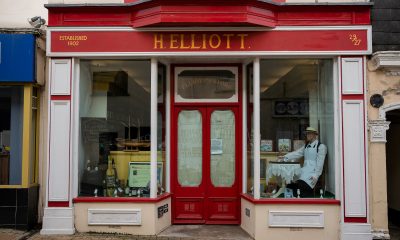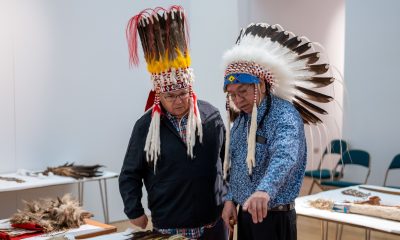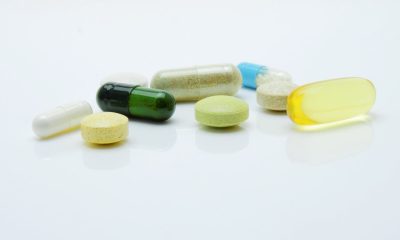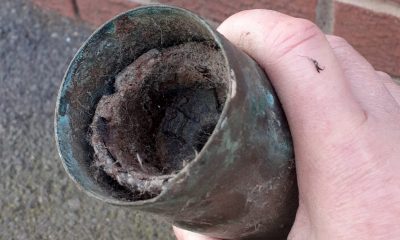This family turns abandoned apples into the world’s best cider
Published
2 years ago onBy
Talker News
By Ed Cullinane via SWNS
A family has been named as making the world's best cider - using thousands of apples they get for FREE from abandoned orchards left over from a 90s trend.
St Ives Cider's Farmhouse in Cornwall, England have their own orchard - but also receive tonnes of apples which would otherwise rot.
Owners David Berwick, 48, and his wife Kate, 46, say the county is full of homes which have orchards that are unreaped.
"One orchard we use now, its owners came up to me at the Royal Cornwall Show and asked if I wanted some apples," David said.

''I said sure, and they said 'I think we've got an orchard.'
"Their trees were 30ft high bramble apple trees and they found them all when they bought the house. We're still using the trees today, and there are places like it all over the county that we're still finding now."
The family has also now been named as making the best still cider at the World Cider Awards.
People across the county have apples they don't know what to do with - or have even discovered overgrown orchards on their land they didn't know were there.
David and his family now have a network of homes, farms and estates he can go to collect apples - some he pays for but many he doesn't.

They now get around 25 percent of their apples from locals and have been awarded numerous global awards for their Cornish cider.
"Probably 25-30% of our apples come from these abandoned orchards," David said.
''Obviously, we rely on our own orchards first, there are just lots of them dotted around.
"You'd be amazed how many of them there are, I think we've probably barely scratched the surface, a lot of their owners probably don't know they're there either.
"There are a lot of the owners that have said if you want the apples come and get them."
There was a huge drive in the 1990s by officials for people to replant Cornish varieties in the county, which sparked a trend.
But when that died off, thousands of trees were left to drop fruit every year and go unused.
"It went well for probably ten years, but of course people just lose interest," David said.
"It was the council that in the 90's were worried that all these Cornish varieties were dying out and just wouldn't exist anymore. So they basically said to people if you want them we'll give you the trees.
"Before then, people weren't planting them. You need a unique variety in Cornwall, it's a lot windier, and a lot wetter and it's a very different climate to the rest of the country.
''They say the original trees were something called 'Cornish Mother' which you come across quite a lot."
Calling English Agriculture a "fickle mistress", David said that the use of Cornish apples was absolutely pivotal to the success of his business which uses pure apple juice to make ciders, where most businesses only use 35% pure juice.
"It would be very easy to call up an orchard in Herefordshire and order tonnes of apples, but there's something about the Cornish variety we've got which has a very distinctive taste and flavor," he said.
"You need to at least use some of them in your blend to get the best quality cider - and those only grow down here".
David noted that his family's winemaking background has meant he takes a unique approach to cider production.
Going from an office job to producing award-winning cider by 2017, David said his standards set by his father, who was President of the UK vineyards association, gives him an edge on competitors.
"To my mind, what I do differently is that I run my cider house to winery standards, which is actually quite a big difference," he said.

"You can get away with a lot more with cider, but I think there's a cleanliness to our cider which you get from extensively cleaning the kit - it looks like a winery in there - which it doesn't always look like in cider houses.
"Nine times out of ten when something goes wrong in the process it is because something wasn't clean.
"I get lots of hobbyists come up to me and ask how they get the flavor so pure and I almost always tell them to clean their kit, and when they've cleaned it, then clean it again."
Since winning the award in the middle of harvest, St Ives Cider has received attention from across the country - and even the world.
Gaining interest from places as far as Hong Kong and Japan for potential imports.
"We've had emails, phone calls, texts with people asking where they can get it," David said.
"Up until now we've basically served Cornwall and my mate in London - we haven't done enough to spread further afield yet and we can sell all of our product here.
"We will eventually reach a stage where you're talking massive investment, hundreds of thousands of pounds, to go beyond a certain amount of capacity, creating belt presses, conveyor belts, automatic lines etc.
"We are mighty small, we're very much a one family band besides some friends I rope in occasionally, but the benefit of that is that nothing goes on here without me at least watching it.
"Because of that you keep the quality up."

David's fine-tuning does come at a cost though, as business can be highly dependent on the weather, much like how Jeremy Clarkson's popular show "Clarkson's Farm" showed.
"I have to say Clarkson's farm is a fantastic program, because it does show just how bloody hard it is," David said.
"It shows a lot just how hard farming can be, life really can be that harsh, you're doing alright to make £140 some years net.
"Clarkson does like to experiment so if he wants to stick an orchard in at Diddly Squat tell him to give me a bell."
Stories and infographics by ‘Talker Research’ are available to download & ready to use. Stories and videos by ‘Talker News’ are managed by SWNS. To license content for editorial or commercial use and to see the full scope of SWNS content, please email [email protected] or submit an inquiry via our contact form.
You may like


Teen celebrates 18th birthday on same lifeboat where she was born


Rare Star Wars Lego set could fetch thousands at auction


Campaign wants to remove ‘lovelocks’ from bridge with somber history


Inside the time capsule shop that closed 50 years ago


Native American headdress set to be returned after a century on display


Cancer charity warns of risk multivitamins pose
Other Stories


New breakthrough treatment boosts cancer-fighting cells
The approach involves activating the immune cells in the body and "reprogramming" them to attack and destroy the cancer cells.


One-year-old can’t stop laughing during first ride at Disneyland
"We didn't expect him to love it that much."


Dad running marathon wearing chainmail weighing over 40 pounds
A dad is attempting to break the world record for the fastest marathon while wearing chainmail.


Hero saves elderly couple by dragging them out of burning car
The Good Samaritan jumped into action after spotting the fire on his way to work.


Bomb squad seals off town after ammunition shell donated to charity shop
Staff discovered the device in a bag of donations.
Top Talkers

 Parenting2 days ago
Parenting2 days agoSingle mom details struggles of feeding her 12 kids

 Broadcast4 days ago
Broadcast4 days agoOver 40% of Americans have no clue what a 401k is

 Broadcast3 days ago
Broadcast3 days agoHow hard is it for Americans to live sustainably?

 Broadcast1 week ago
Broadcast1 week agoGrocery shopping hungry is costing Americans this much

 Funny1 week ago
Funny1 week agoCops confused by crow mimicking police siren

 Shopping1 week ago
Shopping1 week agoGrocery shopping hungry costs Americans this much every trip

 Money4 days ago
Money4 days agoOver 40% of Americans have no clue what a 401k is

 Parenting1 week ago
Parenting1 week agoIt takes this many minutes for the average American kid to get bored
